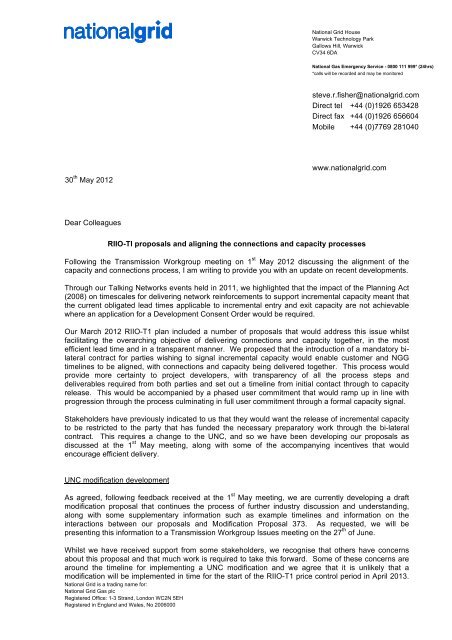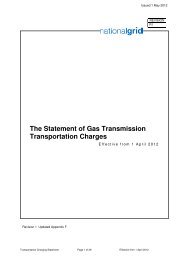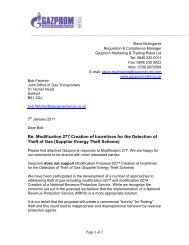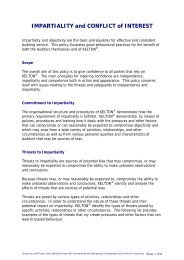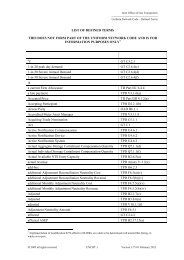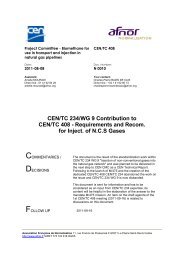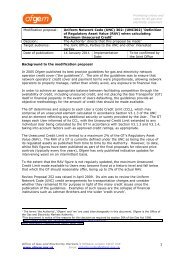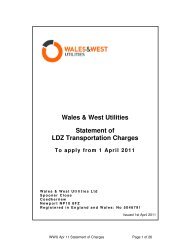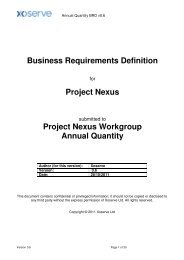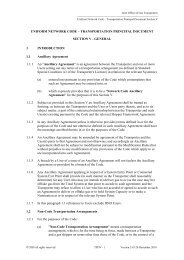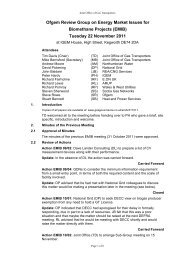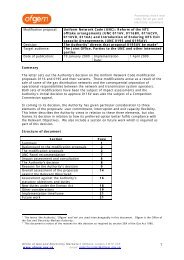Industry Letter provided by National Grid NTS - Joint Office of Gas ...
Industry Letter provided by National Grid NTS - Joint Office of Gas ...
Industry Letter provided by National Grid NTS - Joint Office of Gas ...
You also want an ePaper? Increase the reach of your titles
YUMPU automatically turns print PDFs into web optimized ePapers that Google loves.
30 th May 2012<br />
Dear Colleagues<br />
<strong>National</strong> <strong>Grid</strong> is a trading name for:<br />
<strong>National</strong> <strong>Grid</strong> <strong>Gas</strong> plc<br />
Registered <strong>Office</strong>: 1-3 Strand, London WC2N 5EH<br />
Registered in England and Wales, No 2006000<br />
<strong>National</strong> <strong>Grid</strong> House<br />
Warwick Technology Park<br />
Gallows Hill, Warwick<br />
CV34 6DA<br />
<strong>National</strong> <strong>Gas</strong> Emergency Service - 0800 111 999* (24hrs)<br />
*calls will be recorded and may be monitored<br />
steve.r.fisher@nationalgrid.com<br />
Direct tel +44 (0)1926 653428<br />
Direct fax +44 (0)1926 656604<br />
Mobile +44 (0)7769 281040<br />
www.nationalgrid.com<br />
RIIO-TI proposals and aligning the connections and capacity processes<br />
Following the Transmission Workgroup meeting on 1 st May 2012 discussing the alignment <strong>of</strong> the<br />
capacity and connections process, I am writing to provide you with an update on recent developments.<br />
Through our Talking Networks events held in 2011, we highlighted that the impact <strong>of</strong> the Planning Act<br />
(2008) on timescales for delivering network reinforcements to support incremental capacity meant that<br />
the current obligated lead times applicable to incremental entry and exit capacity are not achievable<br />
where an application for a Development Consent Order would be required.<br />
Our March 2012 RIIO-T1 plan included a number <strong>of</strong> proposals that would address this issue whilst<br />
facilitating the overarching objective <strong>of</strong> delivering connections and capacity together, in the most<br />
efficient lead time and in a transparent manner. We proposed that the introduction <strong>of</strong> a mandatory bilateral<br />
contract for parties wishing to signal incremental capacity would enable customer and NGG<br />
timelines to be aligned, with connections and capacity being delivered together. This process would<br />
provide more certainty to project developers, with transparency <strong>of</strong> all the process steps and<br />
deliverables required from both parties and set out a timeline from initial contact through to capacity<br />
release. This would be accompanied <strong>by</strong> a phased user commitment that would ramp up in line with<br />
progression through the process culminating in full user commitment through a formal capacity signal.<br />
Stakeholders have previously indicated to us that they would want the release <strong>of</strong> incremental capacity<br />
to be restricted to the party that has funded the necessary preparatory work through the bi-lateral<br />
contract. This requires a change to the UNC, and so we have been developing our proposals as<br />
discussed at the 1 st May meeting, along with some <strong>of</strong> the accompanying incentives that would<br />
encourage efficient delivery.<br />
UNC modification development<br />
As agreed, following feedback received at the 1 st May meeting, we are currently developing a draft<br />
modification proposal that continues the process <strong>of</strong> further industry discussion and understanding,<br />
along with some supplementary information such as example timelines and information on the<br />
interactions between our proposals and Modification Proposal 373. As requested, we will be<br />
presenting this information to a Transmission Workgroup Issues meeting on the 27 th <strong>of</strong> June.<br />
Whilst we have received support from some stakeholders, we recognise that others have concerns<br />
about this proposal and that much work is required to take this forward. Some <strong>of</strong> these concerns are<br />
around the timeline for implementing a UNC modification and we agree that it is unlikely that a<br />
modification will be implemented in time for the start <strong>of</strong> the RIIO-T1 price control period in April 2013.
However, we still need to develop a process that meets the requirements <strong>of</strong> the Planning Act and<br />
which will allow us to respond effectively to customer requests for incremental capacity.<br />
In light <strong>of</strong> this, since 1 st May we have been considering alternative options that could be employed as<br />
an interim measure to achieve the same aims <strong>of</strong> aligning customer and NGG timelines, recognising<br />
the implications <strong>of</strong> the Planning Act, without the need for a UNC modification. We believe this is a<br />
sensible approach to take as it removes the reliance on the UNC modification to enact a workable<br />
solution for the impending price control period, whilst allowing that modification to be carefully<br />
considered <strong>by</strong> industry through the appropriate governance.<br />
We have identified an interim solution which we believe could achieve the same aims as our proposed<br />
UNC modification <strong>by</strong> April 2013, with the exception that it does not ensure that incremental capacity is<br />
only available to the signatory <strong>of</strong> the bi-lateral agreements. This interim solution could endure if<br />
stakeholders do not require incremental release to be restricted to the signatory <strong>of</strong> a bi-lateral<br />
agreement, however if this is not acceptable then the UNC modification can continue to be developed,<br />
in parallel, to industry timescales.<br />
The detail <strong>of</strong> our proposal for the interim solution is still being developed and will be submitted to<br />
Ofgem along with our External SO Incentives Submission. This submission will not be made until 31 st<br />
May but we would welcome the opportunity to present this information as a high level introduction, and<br />
to take any immediate questions at the regular Transmission Workgroup on 7 th June, if the Workgroup<br />
is happy to accept this as a late agenda item. We will also present this information at a more<br />
comprehensive level to the aforementioned special Transmission Workgroup on the 27 th <strong>of</strong> June.<br />
Note this submission will also include our proposals in relation to the three incentive areas discussed<br />
on the 1 st May:<br />
• Connection <strong>of</strong>fers;<br />
• Pre-capacity application processes; and<br />
• Post-capacity application timelines.<br />
Next Steps<br />
As noted above, we would like to attend the 7 th June Transmission Workgroup in order to present a<br />
high level introduction to our transitional proposals to move to a process that allows both customer<br />
and NGG connections as well as capacity projects to be delivered together, in accordance with the<br />
requirements <strong>of</strong> the Planning Act. This would depend on the Workgroup’s willingness to accept late<br />
material following the submission <strong>of</strong> our External SO Incentives Submission to Ofgem on 31 st May.<br />
This letter and the material we propose to present at the 7 th June Transmission Workgroup will both be<br />
published on the JO website and accessed through the following link:<br />
www.gasgovernance.co.uk/tx/070612<br />
We will also be publishing the capacity related section <strong>of</strong> the External SO Incentives Submission in the<br />
week commencing 4 th June, along with some high level principle slides highlighting our proposals. We<br />
will ask the <strong>Joint</strong> <strong>Office</strong> to issue a notice providing a link to this material once it is published.<br />
The supplementary detail requested on our SO submission, and draft modification proposal, are being<br />
developed and will be presented to the Transmission Workgroup on the 27 th <strong>of</strong> June, as requested.<br />
In the meantime we would welcome further feedback through one to one discussions with<br />
stakeholders and/or through industry forums to discuss our proposals. We would also welcome any<br />
suggestions for alternative UNC modification proposals that industry may have that could be<br />
considered for development alongside, or instead <strong>of</strong>, our draft proposal.
To arrange a meeting, discuss any concerns, or share ideas for alternative UNC modifications please<br />
contact either myself or Mike Wassell using the contact details below.<br />
Yours sincerely<br />
Steve Fisher<br />
<strong>Gas</strong> Charging and Access Development Manager<br />
Steve Fisher Mike Wassell<br />
<strong>Gas</strong> Charging and Access Development Manager Senior <strong>Gas</strong> Access Analyst<br />
steve.r.fisher@nationalgrid.com mike.j.wassell@nationalgrid.com<br />
01926 653428 01926 654167


